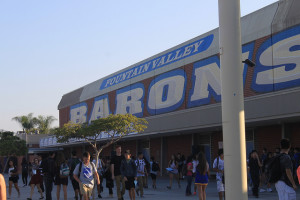Barons getting to class during the school day. Photo by Amanda Hadleyby Amanda Hadley, Staff Writer
Do you ever find yourself hitting the snooze button multiple times each morning or reaching for that extra cup of coffee? Well, you’re just in luck, because struggling to wake up in the morning isn’t necessarily your fault. According to researchers from Oxford University and Harvard University, the times school typically starts at does not biologically align with the sleeping patterns of teenagers.
The study featured students from different grade levels in various parts of the United States. The results from the study showed that students aged 16, performed best when school started around 10 a.m.. As for students aged 18, the study showed that school should start around 11 in the morning. Also, the students that started school later often performed better on exams than students who started school earlier.

However, in previous years the bell rang even earlier than it currently does. First period began at 7:30 a.m., and zero period began at 6:30 a.m. each morning.
“Bus conflicts between schools in the district required an earlier start time,” said Math Teacher Cathy Leo. “A former principal changed the start time one year, but because so few students ride the bus any more, the original conflict is now moot.”
Based off of the study conducted, Fountain Valley High School’s start time is currently best suited for 10 year-olds.
We asked students if they would like a later start time, however it made some students doubtful.
“There is no way that school start time will be pushed back because it has been implemented at the same time for so long,” said Vivian Yenson (’18). “Honestly, as students, I feel like we don’t have a voice in this”
Also, Heather Nguyen (‘18) stated that despite the extra time students would have, they would “still choose to do unproductive activities like play video games or go on social media sites.”






